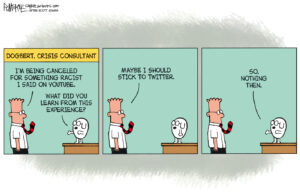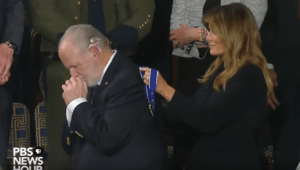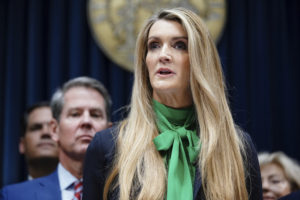The Mormon Issue
Let's say it unequivocally: Mitt Romney's Mormon faith should not be an issue in this presidential campaign. Period. And then let us explore why the Mormon "issue" may be unavoidable -- and what Romney and the rest of us should do about it.WASHINGTON — Let’s say it unequivocally: Mitt Romney’s Mormon faith should not be an issue in this presidential campaign. Period.
And then let us explore why the Mormon “issue” may be unavoidable — and what Romney and the rest of us should do about it.
Romney’s biggest problem is that he is running in a Republican Party that has been saturated by religion in recent years. Other than Sunday’s debate on Fox News, the biggest GOP event during the weekend was the straw poll at the Values Voter Summit, sponsored by the Family Research Council. These are the venture capitalists of the religious conservative movement.
Romney won the poll very narrowly over former Arkansas Gov. Mike Huckabee, who is an ordained Baptist minister. Romney needed to win because his strategy rests on reassembling “the house Ronald Reagan built,” as he put it in the Fox debate, and that most definitely includes social and religious conservatives.
The one thing Romney cannot do to put the Mormon issue aside is to say that religion shouldn’t matter in politics, since so many of those whose votes he seeks believe otherwise. Romney thus speaks often about faith, but in very general terms. “The values of my faith are much like, or are identical to, the values of other faiths that have a Judeo-Christian philosophical background,” he said earlier this month in New Hampshire. “They’re American values, if you will.”
This also means that Romney cannot do what so many have suggested he must: give the equivalent of John F. Kennedy’s 1960 speech to the Greater Houston Ministerial Association in which JFK tried to push aside concerns over his Roman Catholicism.
Recall that Kennedy said his professed religious beliefs would have nothing to do with how he governed. “I believe in a president whose views on religion are his own private affair,” Kennedy said. But the religious conservative movement believes, on principle, that religious faith cannot be a “private affair,” that faith necessarily shapes a politician’s views on public issues.
To win votes from the religious right while pushing the Mormon issue aside, Romney therefore has to say that religion matters a great deal — and also that it doesn’t. Any wonder why this is such a tough matter for him to discuss?
In one respect, Romney’s situation actually is similar to Kennedy’s, but not in a helpful way.
Just as there was mistrust of Catholicism in 1960 on both the left and the right, so do Mormons face mistrust from liberals and conservatives. In Kennedy’s time, there were those on the left who saw the Catholic Church as an anti-democratic, authoritarian institution, while some evangelical Protestants saw it as the Antichrist.
Mormons now face criticism as a non-Christian “cult” from some wings of Protestantism. The hostility is aggravated by an intense competition between Mormonism and evangelicalism for converts. Some on the left see Mormons as hopelessly conservative, hostile to feminism and, in general, just not the sort of folks who would ally with progressive causes.
Setting aside the theological arguments, Mormons are put at an unfair disadvantage because their religion is relatively new and its origins and idiosyncrasies thus rather well-documented. Those of us who follow traditions that are many centuries old have a much easier time rationalizing the stories and practices buried deep in the past that ring strangely to contemporary ears.
As for Mormons being uniformly right wing, consider the existence of the Mormon Democratic Congressional Caucus, whose members include Senate Majority Leader Harry Reid, Reps. Jim Matheson of Utah, Rep.Tom Udall of New Mexico and Eni Faleomavaega, the delegate from American Samoa.
Perhaps because I am a Catholic and a liberal, I find myself drawn to a defense of Romney’s faith. Mormons are now facing prejudices similar to those that Catholics and Jews have confronted, and it is, if I may use the term, anti-American to have religious tests of any kind for public office.
The odd thing is that Romney may find that the liberals he routinely bashes on the campaign trail are his best allies when it comes to combating religious prejudice — and liberals should feel obligated to stand up for the political rights of Mormons, including Romney.
To this end, Romney should give not “the Kennedy speech,” but rather his own account of the religious question. He needs to explain how he can fairly ask that we not hold his faith against him, even as he insists that religious people should vote for him because of the values his faith has taught him. Mormonism should not be an issue. Consistency is another matter.
E.J. Dionne’s e-mail address is postchat(at)aol.com.
© 2007, Washington Post Writers Group
Your support matters…Independent journalism is under threat and overshadowed by heavily funded mainstream media.
You can help level the playing field. Become a member.
Your tax-deductible contribution keeps us digging beneath the headlines to give you thought-provoking, investigative reporting and analysis that unearths what's really happening- without compromise.
Give today to support our courageous, independent journalists.






You need to be a supporter to comment.
There are currently no responses to this article.
Be the first to respond.